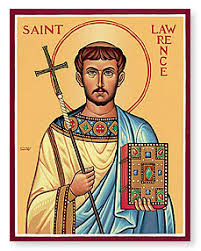HOMILY WEEK 18 06 – Year II
A Spiritual Athlete:
Feast of St Lawrence, Deacon and Martyr
(2 Cor 9:6-10; Ps 112; Jn 12:24-26)
**********************************************
Have you ever participated in a triathelon?
Today’s gospel challenges us to do just that – participate in a spiritual triathelon of three activities: be a grain of wheat that dies, lose our life to find it, and follow Jesus to the cross.
 This feast honouring St. Lawrence provides us with a spiritual athlete who did just that – lived that gospel fully. St. Lawrence was probably a Spaniard from Toledo, one of the seven deacons of Rome around the year 258. A trusted friend of Pope Sixtus II, he was responsible for the administration of the finances of the Church.
This feast honouring St. Lawrence provides us with a spiritual athlete who did just that – lived that gospel fully. St. Lawrence was probably a Spaniard from Toledo, one of the seven deacons of Rome around the year 258. A trusted friend of Pope Sixtus II, he was responsible for the administration of the finances of the Church.
Openly following Jesus in third century Rome was risky business. St Cyprian, Bishop of Carthage, notes Roman authorities had established a norm according to which all Christians who had been denounced must be executed and their goods confiscated by the Imperial treasury. Nonetheless, Lawrence continued his pastoral work with little concern for his own safety.
At the beginning of August 258, the Emperor Valerian issued an edict that all bishops, priests, and deacons should immediately be put to death. Pope St Sixtus II was captured on 6 August 258, at the cemetery of St Callixtus while celebrating the liturgy and executed forthwith.
After the death of Sixtus, the prefect of Rome demanded St. Lawrence turn over the riches of the Church. St. Ambrose is the earliest source for the narrative that St. Lawrence asked for three days to gather the wealth. He worked swiftly to distribute as much Church property to the indigent as possible, so as to prevent it being seized by the prefect. On the third day, at the head of a small delegation, he presented himself to the prefect, and when ordered to deliver the treasures of the Church he presented the indigent, the crippled, the blind, and the suffering, and declared these were the true treasures of the Church. One account records him declaring to the prefect, “The Church is truly rich, far richer than your emperor.” This act of defiance led directly to his martyrdom.
Lawrence was executed on August 10th, 258, three days after Sixtus II and six other deacons. He was one of the most venerated Roman martyrs of the early church (even more than Sixtus for some unknown reason) and the patron of Rome. Lawrence gave his life for his faith in God and for the conversion of Rome. In the words of Jesus himself, “those who hate their life in this world will keep it for eternal life.” By the 6th century, his was one of the more important feasts throughout much of western Christiandom. His name is mentioned along with Sixtus in the canon of the mass (Eucharistic Prayer I).
The death sentence did not take away Lawrence’s joy. Legend tells us as Lawrence was being burned to death on a grill over hot coals, he called out to his executioners, “This side is done. Turn me over and have a bite,” bringing to mind the first reading which tells us God loves a cheerful giver!
So how could Lawrence face his death with so much courage and even good humor? The first reading and psalm provide an answer: God made his grace “abundant” for Lawrence (“God is able to provide you with every blessing in abundance”) and that empowered him to give of himself in a heroic way. Psalm 112 adds “They are not afraid of evil; their hearts are firm, secure in the Lord.” Those words certainly apply to Lawrence, and should also apply to us.
We may not die as physical martyrs, although in this current world climate, that seems more likely all the time. However, we are called to, as Archbishop Emeritus Adam Exner OMI put it in theology class, “Live Calvary in slow motion.” That means daily dying to ourselves, in big and small ways. Or as St. Theresa of Lisieux wrote, we can do small things with great love.
It also means the ability to accept some redemptive suffering in our lives – to be able to accept some inconvenience or suffering without bitterness or resentment, as Jesus did, going to the cross with only compassion and unconditional love in his heart, and words of forgiveness on his lips.
These words of St. Paul ending the first reading should apply to us in our spiritual walk: “God who supplies seed to the sower and bread for food will supply and multiply your seed for sowing and increase the harvest of your righteousness.”
The Eucharist empowers us to run this triathelon to the best of our ability – to be the seed that dies for Christ, that is willing to lose its life to find it again, and that as a servant of the Lord follows him to the Cross.



